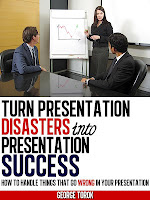When preparing your presentation, consider the things that
might go wrong and plan how you might handle them.
Take the precautions to minimize the possibility or impact of
things going wrong.
Accept the reality that perfection is not the goal. Being
effective with your presentation is the goal.
When things go wrong, appear calm and stay in control of the
show. Remind yourself to pause, breathe deeply and smile. This is likely the
most important point you can learn from this report.
Never lose self-control. There are many things you can’t
control but your behaviour is the one thing for which you are totally
accountable. Don’t appear to be angry, arrogant or frustrated. And don’t
pretend to be blameless. You can’t control what happens to you but you can
control how you deal with it.
When things go wrong, don’t blame somebody else. The audience
is looking at you. They are judging your reaction – not the circumstances.
As the speaker you always have the option to end early or
take a break.
Sometimes a disaster in your presentation can be a gift
because your audience will suddenly perk up and remember how you managed the
disaster. Handle it well and you might win their respect and more.
If your audience likes you, they are more forgiving than you
think. Establish rapport with your audience early so they are onside when
disaster strikes.
Focus your efforts on the portion of your audience that you
have a realistic chance of reaching.
Get your free copy of the eBook How to Turn Presentation Disasters into Presentation Success.
Murphy doesn’t hate you. He simply encourages chaos
to watch you squirm.
Torok’s First Presentation Corollary to Murphy’s Law
Click here to download your free copy of
How to Manage Things That go Wrong in Your Presentation
Presentation Tips on Twitter Presentation Skills Club on Facebook
Executive Speech Coach, Business presentation tips from George Torok, the Speech Coach for Executives


